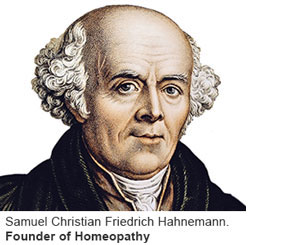-
HOMEOPATHY
A system of medical practice founded by Hahnemann of Leipzig in about 1796, according to which diseases are treated by the administration of drugs, usually in very small doses, which would produce in a healthy person symptoms like those of the disease treated.

-
About Homeopathy
According to the Oxford English Dictionary Homeopathy is defined as “ A system of medical practice founded by Hahnemann of Leipzig in about 1796, according to which diseases are treated by the administration of drugs, usually in very small doses, which would produce in a healthy person symptoms like those of the disease treated. The principal is expressed in the Latin adage ‘Similia similibus curantur’.”
Homeopathy Debate
From the very beginnings of homeopathy, people have argued about whether it works or not. Here is one of the more interesting debates captured on video: Debate on "Does Homeopathy Work?" at the Natural History Museum in London, featuring Dr Ben Goldacre, medical doctor and science writer for The Guardian news...
History of Homeopathy
Samuel Hahnemann, the “Father of Homeopathy”, lived and worked in eighteenth-century Germany. He proposed a system of treatment based on the concepts of the minimum dose and of “like cures like”. This means that the practitioner will use a remedy in the lowest possible potency that will still effect a cure, and that the system of finding that remedy is based on the cross referencing of symptoms in such a way that the eventual remedy or remedies chosen would be causative of those symptoms if taken in excess. Homeopathic remedies are made with many different kinds of substances and at many different strengths and are then chosen by the practitioner as being appropriate to the condition, the patient and the way in which one would best treat that patient. The aim of the practitioner is to achieve cure, if possible and, at the very least, to alleviate symptoms.
At various points in time different schools of homeopathy have emerged, but all basically remain true to the tenets described in Samuel Hahnemann’s book, “The Organon of Medicine”. All homoeopaths practice according to those tenets and we always keep the very first two aphorisms in the Organon in mind every time we see a patient:
“The physician’s high and only mission is to restore the sick to health, to cure, as it is termed.”
“The highest ideal of cure is rapid, gentle and permanent restoration of health, or removal and annihilation of the disease in its whole extent, in the shortest, most reliable, and most harmless way, on easily comprehensible principles.”
Homeopathy has never been practiced in isolation. In Clarke's book "The Prescriber", detailed diets are given for certain conditions, poultices described and lifestyle changes suggested. Treatment has always included patient education in terms of diet and exercise, what to avoid and what would be helpful for the patient.
This has become even more important in today's world, as our easy access to information often leads to excess superficial knowledge and a great deal of confusion. Homeopathy is a growing and dynamic field, difficult to understand and difficult to practice. It requires practitioners to be intuitive, rational and sensible people.
Homeopathy gives great satisfaction to both the patient and the practitioner and can be a guide to the future of medical practice.
It is a gentler, more considerate way of treating the patient. The remedies do not have the long term consequences that allopathic pharmaceutical medicines have, they are more cost-effective, environmentally friendly in their production and storage, and they do not have a cascade effect, i.e. you will never be prescribed a second remedy to treat the side-effects of a first remedy, as frequently happens with pharmaceutical medicines.
Homeopathic Remedies
Homeopathic remedies are produced in a very rigorously controlled manner, carefully monitored throughout production for impurities and for deviations from the prescribed way of producing each remedy. Remedies can be derived from plant , animal or mineral substances. Sometimes disease or allergen components, tissue extracts or samples can be used to make remedies.